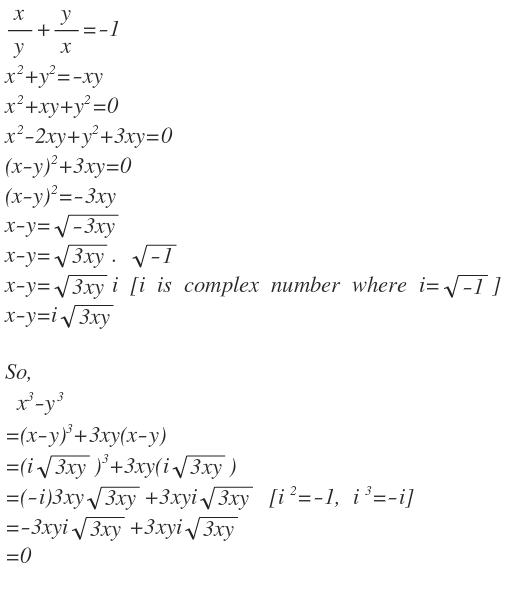An algebra problem by Manish Mayank
If y x + x y = -1, Find the value of x 3 - y 3
The answer is 0.
This section requires Javascript.
You are seeing this because something didn't load right. We suggest you, (a) try
refreshing the page, (b) enabling javascript if it is disabled on your browser and,
finally, (c)
loading the
non-javascript version of this page
. We're sorry about the hassle.
3 solutions
Don't need to do that. x 3 − y 3 = ( x − y ) ( x 2 + y 2 + x y ) . Since we know that x 2 + y 2 + x y = 0 x 3 − y 3 = 0 .
this is what i did :)
There is a short and easy solution to this without using the quadratic formula and complex numbers.
We can use the fact that x 3 − y 3 = ( x − y ) ( x 2 + y 2 − x y )
From the question y x + x y = − 1 , we get that
x 2 + y 2 = − x y ⇒ x 2 + y 2 − x y = 0
Substituting this in our identity above , we get x 3 − y 3 = 0

y x + x y = − 1 x y [ y x + x y ] = − 1 ( x y ) x 2 + y 2 = − x y x 2 + x y + y 2 = 0 u s i n g q u a d r a t i c e q u a t i o n , x = 2 − y ± y 2 − 4 y 2 x = 2 − y ± y 3 i s u b s t i t u t e t o t h e o r i g i n a l e q u a t i o n , y x + x y = − 1 2 y − y + y 3 i + − y + y 3 i 2 y = − 1 2 y ( − y + y 3 i ) [ 2 y − y + y 3 i + − y + y 3 i 2 y ] = ( − 1 ) 2 y ( − y + y 3 i ) s i m p l i f y t h e e q u a t i o n , w e c a n g e t t h e v a l u e o f y , y = 2 3 i + 1 t h e n s u b s t i t u t e t h e v a l u e o f y t o t h e e q u a t i o n o f t h e x , x = 2 − y + y 3 i x = 2 − 2 3 i + 1 + 2 3 i + 1 ( 3 i ) x = − 1 t h e r e f o r e t h e v a l u e o f x a n d y i s − 1 & 2 3 i + 1 s u b s t i t u t e t h e v a l u e s t o t h e e q u a t i o n x 3 − y 3 = ? ( − 1 ) 3 − ( 2 3 i + 1 ) 3 = 0 t h e a n s w e r i s 0 .